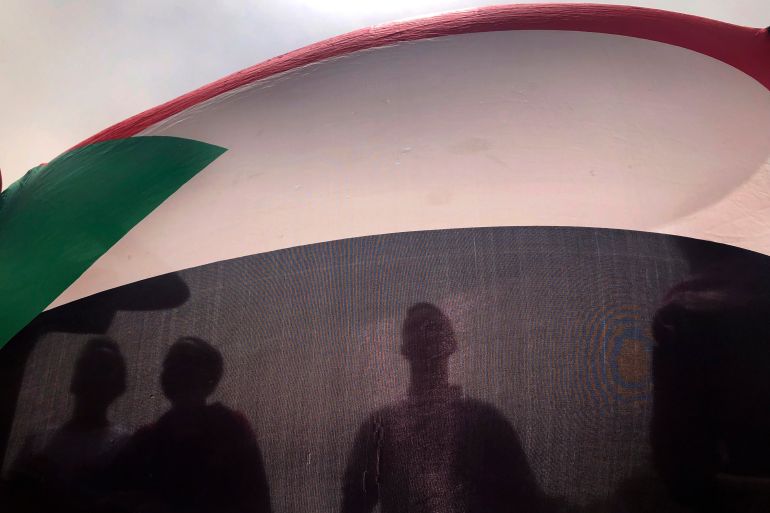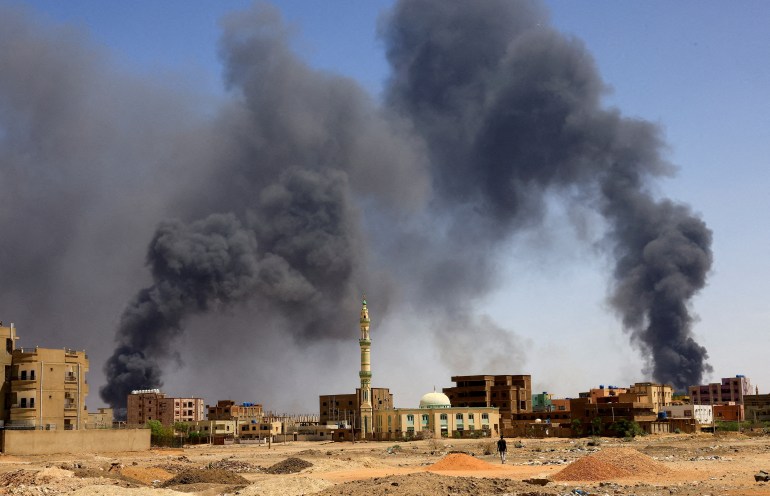Three pro-democracy activists arrested in Sudan
Experts say arrests are part of a broader campaign by the army to consolidate control over aid relief.

Sudanese security forces have arrested three activists from the country’s pro-democracy movement, according to a family member, their peers and local media reports.
Mohamad “Tupac” Adam, Mohamad al-Fattah and Mohamad al-Bushra were arrested while convening a meeting at a primary school to discuss how to aid internally displaced people on Tuesday morning in Madani, a city in northern Jazeera state, Adam’s mother told Al Jazeera.
Keep reading
list of 3 itemsPhotos: Sudanese capital devastated by a month of brutal fighting
Fleeing Sudan: ‘I had to do it for my daughter’
Adam and al-Fattah often distributed food and aid to people arriving in the city after fleeing the conflict in the capital Khartoum, activists and residents said.
They added that the young men were detained by the Central Reserve Police Force, which is aligned with the Sudanese army in its fight against the paramilitary Rapid Support Forces (RSF).
“I’m very scared and I don’t know what to do now,” Adam’s mother, Nidal Arbab Suliman, told Al Jazeera from her home in the capital Khartoum. “I’m afraid that if anyone else in our family leaves the house, they will be beaten up or arrested.”
It was not immediately clear why the men were arrested. Al Jazeera has contacted Sudan’s army spokesman Nabil Abdullah for comment.
Activists and analysts say the arrests on Tuesday are part of a broader campaign by the army and allied forces to crack down on well-known personalities from the pro-democracy movement and consolidate control over aid relief.
Since the conflict erupted on April 15, medics, journalists and politicians have been smeared, threatened and attacked. Members of the resistance committees – neighbourhood groups leading calls for democracy and providing vital provisions to civilians caught in the fighting – are also being targeted.
On May 7, the army detained two men from a resistance committee for escorting wounded RSF fighters to a hospital, before publishing a statement that justified the arrests by equating the activists with enemy combatants.
The two were released the following day after a public outcry.
“One narrative the army has tried to portray is that because resistance committees are engaged in humanitarian work, they are somehow supporting the RSF,” Hamid Murtada, a Sudanese analyst and a member of a resistance committee, told Al Jazeera from Cairo in Egypt, where he recently arrived after fleeing Khartoum.
“That gives the [army] an excuse to target them, kidnap them and even kill them.”
Torture and maltreatment
Adam and al-Fattah were among hundreds of prisoners who escaped last month after the RSF attacked prisons in Khartoum.
Adam was previously detained by security forces two months after the October 2021 military coup that derailed the country’s transition to democracy, after taking part in anti-coup protests. He and two other people were accused of killing a police officer. Adam’s lawyers said he was denied due process and was tortured.
His case became a rallying cry of the pro-democracy movement, prompting rights groups such as Amnesty International and Human Rights Watch to advocate for a fair trial and humane treatment.
But as the conflict in Sudan escalates, there is increasing domestic and international focus on allegations of human rights abuses but less attention on the treatment of prisoners. Rights groups have documented accounts of sexual abuse and rape, allegations of arbitrary arrests and abductions and damage to medical facilities.
The lack of monitoring means that the de facto authorities have little reason to fear repercussions for subjecting prisoners to maltreatment, according to Emma DiNapoli, an expert in international law who has followed Adam and al-Fattah’s cases.

“Even before the conflict … prisons were overcrowded, detainees were routinely subjected to torture and ill-treatment and the judiciary was not up to the task of safeguarding rights. Tupac and al-Fattah’s experiences in prison bear this out,” she told Al Jazeera.
“Now, given the situation in Sudan, we can only expect a deterioration in conditions in detention centres, with very high risks of torture or deprivation of food and water and only limited ability by lawyers to monitor conditions and advocate for detainees.”
Competing for legitimacy
Military intelligence arrested three more resistance committee members from Khartoum North on Tuesday, the area’s resistance committee tweeted.
It said in a statement that the activists were taken from their homes without explanation.
Murtada said he believes that the army and its allies are attempting to disrupt and punish resistance committees for assuming the role of service provision in order to consolidate control over the humanitarian response.
Since the conflict started, the committees have procured fuel to power hospitals, managed food and medicine distributions and set up clinics across the capital.
“[The arrests of activists] manifested in how the [army] is trying to control the international assistance coming in,” Murtada said.
Last week, Sudan’s Ministry of Foreign Affairs called on international aid organisations to coordinate relief distribution with the Humanitarian Aid Commission (HAC), a government agency.
“Unfortunately, the international community isn’t saying no to [cooperating with the army] despite knowing how the entities of the Sudanese Armed Forces like HAC can’t be trusted to deliver humanitarian assistance,” Murtada told Al Jazeera. “The army is using [aid] for political gain.”
Additional reporting by Hiba Saleh Abdel Azeem